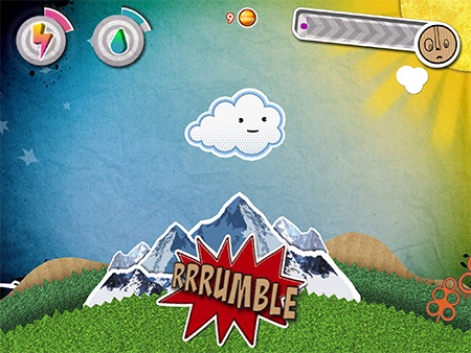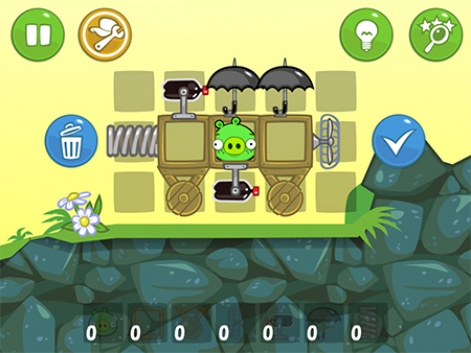Hits such as CSR Racing and Bad Piggies are just some of the latest high profile poster boys for the development engine.
But could opting for such third-party technology crimp a game's potential? Or does tapping into the support networks offered by these tools offset any such limitations?
The in-house option
Steve Stopps is a project director at Blitz Games, which recently released its mobile debut, Kumo Lumo.
Stopps says that Blitz decided to employ its in-house BlitzTech engine over the third-party alternatives in order to best exploit the underlying hardware.

Blitz Games' critically acclaimed Kumo Lumo
"BlitzTech has always been a cross platform toolset, and additional work is required with each new platform we support," Stopps says.
"Every platform has its own strengths and weaknesses, and getting the most out of the hardware is often one of the biggest challenges we face.
"Often we find we need to use a combination of old and new techniques to get the best results remember we have been making games since the 8-bit days."
Blitzing up new solutions
By way of example, Stopps points out that current generation consoles rely heavily on full screen post processing effects to deliver particular visual styles. These effects are not yet possible on many mobile devices.
"However, that doesn't mean we can't achieve the same visual results through different methods," he explains.
The long-term development of the BlitzTech engine over several years also puts Blitz in a strong position to quickly adapt its systems to a variety of platforms, supported by in-house technology experts.
"We get unparalleled support from the BlitzTech team. We believe that games should be creative endeavours first and foremost, and should not be limited by technical constraints. BlitzTech gives us that freedom, with the added safety net of a team of brilliant technicians who can help us out of even the tightest of technical corners."
Given the strength of these technology teams, did Blitz consider creating a brand new engine for iOS?
"Creating a bespoke version of our engine goes against our ethos," says Stopps. "What happens if we create an amazing game for mobile, and want to take it to the next generation of console?
"Our biggest strength lies in the cross platform support of BlitzTech. As a studio we're working hard to push the boundaries of what is possible on mobile and our early tests have been going very well."
Altogether now with Unity
On the other end of the spectrum, a vast number of mobile games are being created using the Unity game engine and tools. Doing so reduces the costs associated with creating tools in-house.
It also encourages the development community to collaboratively solve issues with the software.
A further advantage, according to Unity's CEO David Helgason, is that keeping up with technological change becomes somebody else's problem - specifically, his.
"It's amazing how fast mobile hardware evolves," says Helgason.
"For us it's a real challenge to keep up, but we do it with a combination of smarts, hard work, and lots of manpower.
"Now, that it's hard work for us means that for most developers who don't have our scale it's either impossible or at least not cost effective, which puts an even larger burden of responsibility on us to deliver."

Rovio's latest monster hit and Unity flagbearer Bad Piggies
Of course, deciding to go with a third-party engine doesn't necessarily mean going with Unity. But Helgason isn't shy of making an observation or two about his most high-profile competitor, Epic.
In comparison with its Unreal engine, Helgason argues Unity is more polished, "extremely multiplatform", and has a genuinely friendly business model.
"Unreal 4 looks great on paper, but is also targeting really high end platforms," he says.
"We intend to support these really well too once they exist, but remain strong believers in helping developers solve their problems day by day.
"We work extra hard to make sure that our tools work well both on DirectX11 grade hardware as well as on old iPods and iPhones. This isn't easy, but our customers love it."
Community and collaboration
In Helgason's view, it was his company's decision to hire engineers who had previously worked on console games and, he claims, written "some of the world's best console engines" - that appeals to developers looking for a one-stop shop development engine.
"These guys are hard at work at pushing Unity on consoles, as well as pushing the core of Unity to be able to do amazing work on all the platforms we support," he adds.
"More and more of the big studios use Unity instead of building themselves. While relying on anyone but oneself poses a risk, there is an equal or bigger risk in relying on oneself, and the economics come out wildly in favour of using Unity.
"In the near future, developers can expect more features and optimisations, more flexibility, even better tools. But also, most importantly: a stable and long-term platform to build on."
Unity undoubtedly brings reduced costs nullifies many of the complications that are part and parcel of developing for multiple devices at the same time, but it also takes away the control of knowing your own tools inside and out and the ability to modify them to suit your exact needs.
Developers like Blitz have good internal technical support, but what of the new development community growing around Unity?
No doubt, its supporters would argue some studios are missing out on a whole new kind of support network - one built around the idea of developers collaborating to find solutions.
Check back for part 2 - a closer look at why building up a development community has become a key to the success of third-party dev engines - on Monday.





















